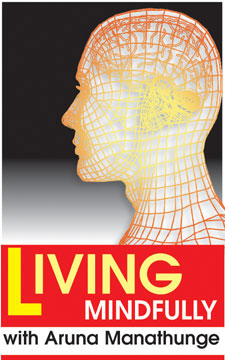|
Benefits of Long-term Mindfulness:
Changing the Emotional Set-Point
Last week we learned about emotional set-point and how our untrained
minds function most of the time facilitating such a set point of emotion
in the long run. We also identified the 'default mode' of our mind is
mind-wandering and it leads the untrained minds to be carried away by
anger, stress, restlessness, frustration and unhappiness.
 Moreover,
mind-wandering is known, according to Neurology, to correlate with
neural activity in a network of brain areas known as the default-mode
network that support self-referential processing. This brain network has
been associated with processes ranging from the usual attentional lapses
to anxiety, ADHD and Alzheimer's disease. Moreover,
mind-wandering is known, according to Neurology, to correlate with
neural activity in a network of brain areas known as the default-mode
network that support self-referential processing. This brain network has
been associated with processes ranging from the usual attentional lapses
to anxiety, ADHD and Alzheimer's disease.
Given the interrelationship between the default-mode network,
mind-wandering and unhappiness, a worthy question to be asked is, is it
possible to change this and be happier? Yes, it is possible through long
term regular practice of Mindfulness.
Mindfulness includes two complementary components: (1) maintaining
attention and awareness on the immediate experience, and (2) maintaining
an attitude of non-reactive acceptance towards that experience.
Let's take the example of the young mother we discussed last week.
The alarm goes off at 4.30 a.m. The young mother wakes up to the
sound of the alarm and soon thoughts about what needs to be done come
rushing to her mind.......
...While all that goes on her mind she walks to the wash room
automatically. She is oblivious to the tasks she performs at the wash
room as her mind is elsewhere, mind-wandering.
The same young mother will act differently after long term training
in Mindfulness. Her thought process may be as follows;
She wakes up naturally at 4.30 a.m. without the aid of an alarm
clock. She knows that she has woken up before opening her eyes. She
becomes aware of the touch of the bed, sounds within and outside of the
room and her breathing. She gently gets up from the bed, aware of her
bodily movements and the bodily sounds. The day's work comes to her mind
and she acknowledges and notes those thoughts - without getting carried
away by them. She walks to the washroom very consciously, feeling the
touch of her feet on the flow and the sensation of her hand touching the
door of the wash room. She does the daily tasks at the washroom very
consciously with awareness.
Conscious field of awareness
The long-term practitioners gradually learn to apply mindfulness in
all aspects of experience, whether during formal meditation or everyday
life. They directly attend to whatever that arises in one's conscious
field of awareness at any moment. During such training they learn to
clearly identify when self-related thoughts and emotions are occurring
(self-referential processing) and to differentiate identification of
those from identifying with them. As an example, the awareness that
anger is present Vs 'I am angry'.
 Mindfulness
meditators practice 'noticing' or 'noting' when they are identifying
with an object and to 'let go' and bring back the attention to the
present moment. The aim of this is to reverse the habit of
mind-wandering, which has been defined as 'thinking about something
other than what one is currently doing'. Mindfulness
meditators practice 'noticing' or 'noting' when they are identifying
with an object and to 'let go' and bring back the attention to the
present moment. The aim of this is to reverse the habit of
mind-wandering, which has been defined as 'thinking about something
other than what one is currently doing'.
This information processing task is a training of attention away from
self-reference processing and mind-wandering, which in the long term
leads to the weakening of the activity of the default mode brain
network. This has been associated with positive changes such as improved
attentional focus, improved intellectual flexibility, improved and early
recovery from sad events experienced in one's life, reduced emotional
reactivity while enhancing emotional regulation and general contentment
and happiness with one's life.
Over time, such changes lead to the re-setting of the emotional set
point of long term Mindfulness practitioners. In fact, it is a dynamic
change as the benefits of Mindfulness practice increase along with the
length and the depth of the practice.
The long term and regular practice of Mindfulness can certainly
change the emotional set-point.
As in the sea, they learn that they can't stop the waves but can
certainly learn to ride and surf the waves.
Aruna Manathunge has practiced Mindfulness for over 42 years. During
the past 7 years he has closely followed the development of Mind Science
in the Western world. He has had a long career as the Country Head of
Sri Lanka and the Head of the Indian Sub-Continent of an American
Pharmaceutical Multinational company. Presently Aruna conducts Coaching
in Mindfulness to Schools and Companies. Aruna can be contacted at
[email protected]
|


